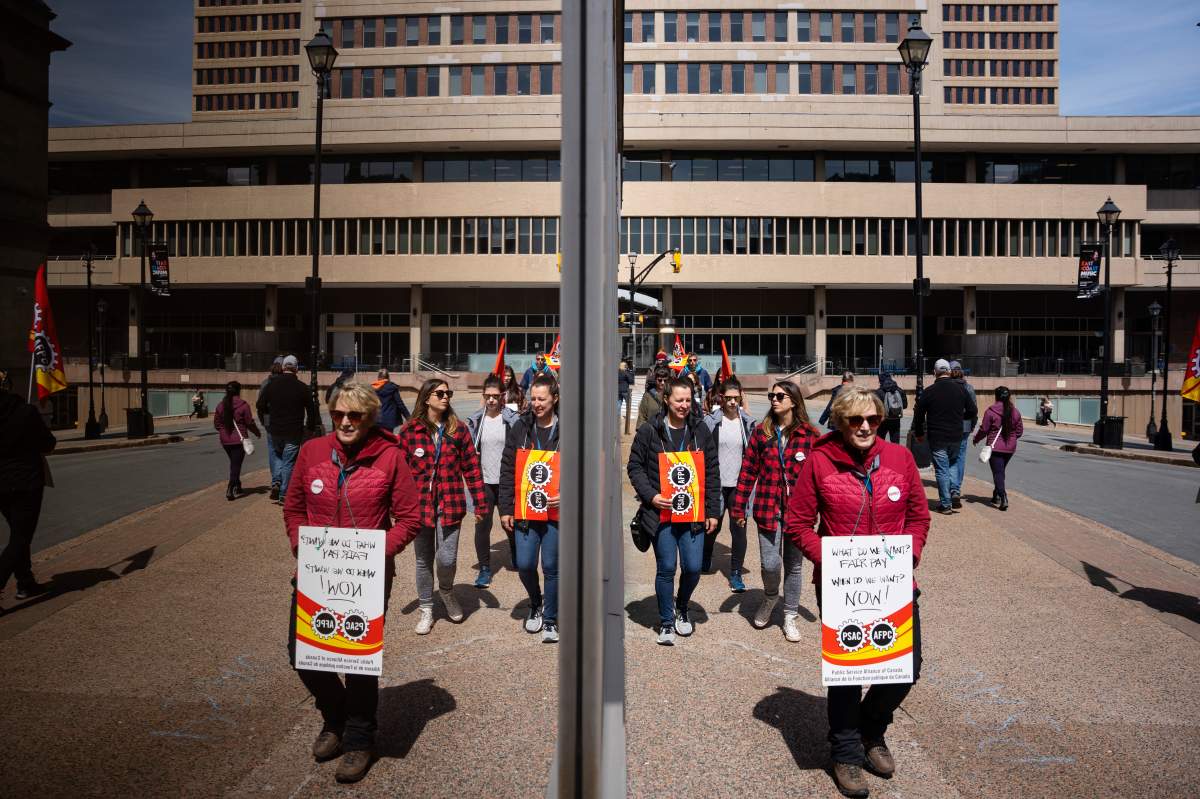The union carrying out what it calls one of the largest strikes in Canadian history says the federal government is “stalling” on talks for a new collective agreement.

Public Service Alliance of Canada (PSAC) national president Chris Aylward made the claim Wednesday on Parliament Hill – which was the site of the “largest picket event of the strike” so far, the union said.
The strike, which has gone on for eight days now, has seen more than 100,000 federal public servants across the country walk off the job while the union negotiates a new collective agreement with Ottawa for some 155,000 workers, including those deemed essential and who must continue working.
Treasury Board President Mona Fortier said in a statement Wednesday that while Ottawa is determined to reach an agreement with the union, it needs PSAC “to start bringing their demands in line with the Public Interest Commission recommendations.”

Earlier this year, that independent arbitrator recommended a nine per cent wage increase over three years. Ottawa has tabled that offer – with a signing bonus – but PSAC has been seeking a 13.5 per cent increase over three years.
Aylward said PSAC has “moved off” its wage demands, but did not provide specifics. He said the federal government told the union Tuesday night it was not changing its current wage offer. Aylward added the union has not seen a final offer from the government.
“If you look at what the employer is doing, simply saying, ‘No, we’re not coming back with another offer,’ they are stalling,” he said.
“They’re still at nine per cent over three years. We have moved off our wage demand, but yet the employer hasn’t moved on their wage demand, yet they’re telling us that we’re the ones that have to move.”
Fortier said in an open letter Monday that Ottawa has reached agreements with PSAC on more than 560 union demands, but four key issues remain unresolved: wage increases, remote work as a negotiated right, a ban on contracting out and deciding who gets laid off in the event of cuts based on seniority.

Get daily National news
The government has also promised to review the telework directive “for a post-pandemic world,” she said, while declining to say if it will consider PSAC’s demand that it become part of the collective agreement.
The demand for seniority-based retentions will also be considered, she added.
Finally, while Fortier pointed to the latest federal budget’s commitment to reduce the use of contractors as part of a bid to cut costs, she wrote a full ban on contracting “would severely compromise the government’s ability to deliver services and work for Canadians.”

“Employees have the right to strike, and we fully respect that. We are committed to delivering a fair deal that recognizes the valuable contributions that public servants make every day,” Fortier said in the Wednesday statement.
“But let me be very clear, these agreements must be in the best interest of Canadians. We will not sign agreements that the country cannot afford, nor ones that severely impact our ability to deliver services to Canadians.
“We remain at the negotiating table. The sooner the PSAC is ready to make real progress, the sooner we can deliver wage increases for our employees and end this strike.”
In recent days, the strike intensified with union leaders ordering members to demonstrate outside “strategic” government locations. Federal ministers have said they are monitoring for blockades of critical roads and infrastructure. Immigration Minister Sean Fraser said Wednesday morning disruptions to important services are getting more severe, with citizenship ceremonies cancelled and the immigration backlog growing.
“It’s frustrating to know that Canadians may, as the days come, have more difficulty accessing services, but that’s a motivator for everyone to try and resolve this. The union is certainly very aware of Canadians’ impatience and they have to calibrate that carefully,” Prime Minister Justin Trudeau said Wednesday.
“As a government, we are there to respect collective bargaining. We’re there to make progress at the table, and right now, progress is being made. There’s an ebb and flow in these negotiations always, but we’re going to continue to stay positive and constructive.”
Both sides have accused each other of obstructing negotiations and being too slow to respond to key developments.

Aylward said the union would not accept the government’s current wage offer if Ottawa opened up on every other PSAC demand. He also called on Trudeau to directly intervene and settle the dispute.
“If this employer continues to say that they’re not moving off their position, where do we go? That’s the dilemma that we’re in,” he said.
“I can tell you right across the country, members are still out on strike. We still have over 100,000 members on strike and we’re going to stay here until we get this resolved.”

Meanwhile, the Union of Taxation Employees (PSAC-UTE), a subdivision of PSAC, is separately negotiating a contract for more than 35,000 striking Canada Revenue Agency (CRA) workers. PSAC represents roughly 120,000 federal public servants.
PSAC-UTE and the CRA appear to remain far apart.
In a news release Monday, the CRA said it had presented a wage increase offer “in line” with the independent arbitrator’s recommendation of nine per cent over three years. PSAC-UTE’s initial wage demand was a 29.5 per cent increase over three years, as well as other non-wage-related demands.
PSAC-UTE said on its website Tuesday that some issues related to hours of work have been resolved, but it remains in dispute over key issues with the CRA, including wages, remote work and job security.
— with files from Global News’ Sean Boynton and The Canadian Press










Comments
Want to discuss? Please read our Commenting Policy first.